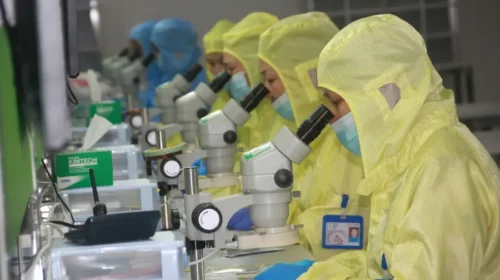Kindstar Globalgene finds bargain in solid tumor testing acquisition

The testing services provider’s proposed $31.3 million purchase price for AnchorDx represents a heavy discount to the company’s earlier valuations
Key Takeaways:
- Kindstar Globalgene’s proposed acquisition of AnchorDx would allow it to quickly find a place in the field of testing for major solid tumors such as lung and gastric cancers
- A business bump during the pandemic has given Kindstar ample resources to fund the purchase, including 2 billion yuan in cash at the end of June
By Molly Wen
Antigen and antibody testing specialists had their day in the sun during the pandemic, when demand for their products soared with the sale of billions of Covid tests. But with those tests quickly becoming an afterthought, the in vitro diagnostic (IVD) industry is also feeling a post-pandemic hangover.
Compounding the issue, IVD companies in China are getting squeezed by the country’s centralized national procurement program that demands big discounts, as well as an anti-corruption campaign sweeping the broader medical industry. The resulting bloodbath is creating fertile ground for consolidation, with better-run companies with competitive edges scooping up peers to expand their product portfolios through M&A.
Such dealmaking was at the forefront when Kindstar Globalgene Technology Inc. (9960.HK), a leading third-party testing service provider in the IVD industry, last month announced its intent to acquire AnchorDx for $31.3 million in cash and equity.
AnchorDx HK, which is controlled by AnchorDx founder Fan Jianbing, will receive approximately $12.2 million. Six early investors, including Kingmed Diagnostics (603882.SH), WuXi AppTec (2359.HK), and its Suzhou 6 Dimensions investment arm, will receive a total of 58.88 million yuan ($8.37 million), while OrbiMed and ARCH Venture chose to receive 59.43 million shares of Kindstar Globalgene, worth approximately HK$84.39 million ($10.7 million), instead of cash.
AnchorDx founder Fan Jianbing is globally renowned in the field of genetic testing, helping his company secure its list of high-profile backers in four earlier funding rounds. That included $28 million from its B-round in 2017, and another $40 million in its C-round four years later. Based on the latest purchase price, investors in those two earlier rounds may have lost more than 50% of their investment.
For example, B-round investor Kingmed received 4.82 million yuan for its AnchorDX shares in the Kindstar buyout, even though it paid 13.21 million yuan for the stake in 2017, resulting in a loss of about 64% of its investment.
As one of the first companies in China in its field, Kindstar provides special testing services for hospitals in six major fields, including hematology, neurology, genetics and rare diseases, infectious diseases, solid tumors, and gynecology. It has been the leader in hematology testing for many years in terms of market share, and is a leader in the niche market segment.
AnchorDx is a leader in China in its field, which mainly covers early screening, diagnosis and monitoring for high-incidence cancers such as lung, breast digestive system and urinary system cancers. Its two core products are both classified as first-in-class among its peers.
One, PulmoSeek Plus, is a global leader in early screening and diagnosis for lung nodules, able to differentiate benign and malignant nodules. It has been recommended by Chinese experts for the diagnosis of early-stage lung cancer and obtained IVDD CE certification in the EU.
The other product, UriFind, can assist in the diagnosis of patients with suspected urothelial carcinoma by detecting the methylation of urinary cell DNA. It has been awarded breakthrough therapy designation (BTD) by the U.S. Food and Drug Administration (FDA) and a class three medical device registration certificate by China’s National Medical Products Administration (NMPA).
The latest acquisition will give Kindstar a quick entre into the field of testing for major solid tumors such as lung and gastric cancers using AnchorDx’s existing business segments, enhancing its strength in specialized tumor testing. Under terms of the deal, Fan will continue to lead his team, which may smooth the combination of the two companies and reduce any integration risks.
Deep-pocketed buyer
So, why would AnchorDx sell itself at such a low price? The answer may lie in its tight finances. The transaction announcement disclosed that AnchorDx has been bleeding money in recent years, including losses of 137 million yuan in 2022 and 122 million yuan last year, and another 45 million yuan in the first half of this year. As a result, the company’s net asset value fell to negative 473 million yuan by the end of June.
Those losses have come as China’s biomedical industry has been navigating a long cold winter since 2021, including plummeting investment in the sector. With slim hope of finding new funds to sustain its development as an independent company, AnchorDx was likely driven to sell itself. And in the current market where funds are scarce and money-losing companies abundant, it probably had relatively little leverage to negotiate a lucrative deal.
While AnchorDX’s finances look precarious, Kindstar, as a relatively mature company in the in vitro diagnostic industry, looks far more stable. The surge in demand for testing products during the pandemic boosted its revenue up by 49% in 2022 to 1.39 billion yuan, and its net profit that year doubled to 75.5 million yuan. While Covid-related testing revenue plummeted after the pandemic subsided, the company offset some of that as its non-Covid business rebounded. Despite the drop in Covid-related business, Kindstar’s revenue dropped by a relatively mild 3.9% to 473 million yuan in the first half of this year, though its profit plunged by a larger 75.8% to 10.52 million yuan.
Kindstar’s fat profits during the pandemic have fattened up its coffers, giving it around 2 billion yuan in cash at the end of June. Such deep pockets have provided the company not only with a big cushion to sustain it through leaner times ahead, but also with funds to expand its business through M&A. In July it acquired 11.4% of Beijing Bo Fu Rui Gene Diagnostics, a company specializing in molecular immune index testing services in the field of transplant medicine, as well as related reagents and equipment, for a total consideration of about 32 million yuan.
Kindstar’s shares rose more than 11% in three days after it announced its AnchorDx acquisition. But the company might still be undervalued given its current price-to-book (P/B) ratio of just 0.4 times, which is well behind the 1.7 for Kingmed, the leader in the industry for independent clinical testing. That could present a buying opportunity for investors who believe Kindstar is undervalued, especially as it boosts its competitiveness and market position with the completion of its recent acquisitions.
To subscribe to Bamboo Works weekly free newsletter, click here





